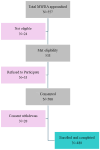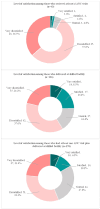Navigating challenges in access to antenatal and intrapartum care: Afghan refugee women's experiences amidst the COVID-19 pandemic in Pakistan
- PMID: 40554753
- PMCID: PMC12188067
- DOI: 10.1177/17455057251347081
Navigating challenges in access to antenatal and intrapartum care: Afghan refugee women's experiences amidst the COVID-19 pandemic in Pakistan
Abstract
Background: Balochistan, Pakistan's most economically and health system-deprived province, hosts a significant portion of the Afghan refugee population. The province's already fragile healthcare infrastructure faces additional strain due to the refugees.
Objective: This study aimed to investigate the barriers to antenatal and intrapartum care seeking among Afghan refugee women in Balochistan during the Coronavirus disease 2019 (COVID-19) pandemic.
Design: This study employed a cross-sectional survey approach to assess antenatal and intrapartum care-seeking behavior among Afghan refugee women residing in Balochistan, Pakistan. The study focused on refugee women living in Kharotabad Union Council in Quetta city to understand their barriers to accessing maternal healthcare services.
Methods: The survey focused on antenatal and childbirth care-seeking behaviors among married women of reproductive age (MWRA) with at least one child aged 12-23 months born during the first four waves of COVID-19 in Pakistan.
Results: Of 480 MWRAs, only 36.9% sought antenatal care (ANC); only 13.1% received at least four ANC visits. Furthermore, only 38.8% of MWRA had skilled birth attendance. Only 32.9% of MWRAs received at least one ANC and had skilled birth attendance (i.e., comprehensive care). Accessing comprehensive care was associated with maternal age less than 25 years (adjusted odds ratio (OR): 0.40; 95% confidence interval (CI): 0.21, 0.78), Tajik ethnicity (adjusted OR: 0.40; 95% CI: 0.23, 0.70) and large family size (adjusted OR: 0.58; 95% CI: 0.37, 0.93). Predictors of poor access were concern related to documentation of the refugee women they faced (adjusted OR: 1.52; 95% CI: 1.00, 2.34), women with no one at household to accompany them at health facility (adjusted OR: 1.75; 95% CI: 1.13, 2.70), myths and misconceptions related to available care (adjusted OR: 1.89; 95% CI: 1.18, 3.02), and the transport availability (adjusted OR: 1.76; 95% CI: 1.12, 2.77). Concerns related to COVID-19 had no association.
Conclusion: The study highlights the barriers to maternal, neonatal and child health service utilization among Afghan refugee women in Balochistan. Tailoring healthcare services to consider age, ethnicity, cultural dynamics, and system constraints is crucial for improving access.
Keywords: Afghan refugee women; access to care; health resilience; maternal; neonatal and child health.
Plain language summary
Access to care Afghan refugee women in PakistanBalochistan is Pakistan’s most underserved province in terms of healthcare and economic resources, and it is home to a significant number of Afghan refugees. The already weak healthcare system in Balochistan faces further challenges due to the needs of the refugee population. This study explored Afghan refugee women’s challenges in seeking maternal, newborn, and child health (MNCH) care during the COVID-19 pandemic. The research focused on married Afghan refugee women living in Quetta city who had given birth during the first four waves of COVID-19 in Pakistan. Out of 480 women surveyed, only 37% received antenatal care (ANC) during pregnancy, and just 13% completed the recommended four ANC visits. Additionally, fewer than 39% of women had skilled professional assistance during childbirth, and only 33% accessed both ANC and skilled birth attendance, which is considered comprehensive care. The study found that younger women under 25 years old, women from the Tajik ethnic group, and those with larger families were less likely to access comprehensive care. Barriers included concerns about legal documentation, lack of someone to accompany the women to healthcare facilities, myths and misconceptions about healthcare services, and lack of transportation. Interestingly, concerns about COVID-19 did not appear to impact healthcare-seeking behaviors. These findings emphasize the need for healthcare services that address the specific barriers faced by Afghan refugee women in Balochistan. Providing culturally sensitive healthcare, ensuring better transportation options, and debunking myths about healthcare services could improve access to essential MNCH care. Addressing these issues is critical to ensuring the well-being of Afghan refugee mothers and their children.
Conflict of interest statement
Declaration of conflicting interestsThe author(s) declared no potential conflicts of interest with respect to the research, authorship, and/or publication of this article.
Figures
References
-
- UN Refugee Agency (UNHCR). UNHCR Refugee Data Finder [cited 13 November 2023], https://www.unhcr.org/refugee-statistics/
-
- International Organization for Migration. Migration Data Portal. The bigger picture [cited 13 November 2023], https://www.migrationdataportal.org/infographic/afghan-refugees-and-undo...
-
- Ali Y, Sabir M, Muhammad N. Refugees and host country nexus: a case study of Pakistan. J Int Migr Integr 2019; 20: 137–53.
-
- The Assessment Capacities Project (ACAPS). Afghanistan. Information and analysis ecosystem. Thematic report [cited 13 November 2023], https://www.acaps.org/fileadmin/Data_Product/Main_media/20220321_acaps_t... (2022).
-
- United Nations Children’s Fund (UNICEF). Health. Ending preventable maternal, newborn and child deaths. Afghanistan [cited 3 March 2024], https://www.unicef.org/afghanistan/health
MeSH terms
LinkOut - more resources
Full Text Sources
Medical



